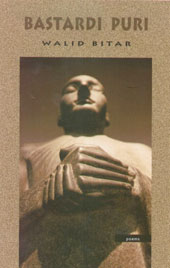The Porcupine's Quill
Celebrating forty years on the Main Street
of Erin Village, Wellington County
BOOKS IN PRINT
Bastardi Puri by Walid Bitar
This is Beirut-born Canadian immigrant Walid Bitar’s third collection of poetry, and was described by the Midwest Book Review as ‘a hybrid cross between raw emotion, vibrant energy, caustic wit, and painful revelation.’ Ezra Pound famously defined literature as ‘news that stays news’ - and Bastardi Puri, which launches from the political and aspires to the universal, is just that sort of news.
Walid Bitar’s poems read as if transmitted in softly staccato impulses from some remote time-warp in the tenth dimension. They crackle with the static of unique ciphers hurled over huge distances and we don’t know at first whether they are entreaties or imprecations. Certain poems threaten, others cajole; all buzz with an energy of language that sometimes splits open the husks of their forms. Weird images and weirder personages perch upon his stanzas, not only Rhodesian Ridgebacks in constitutional snits, Actaeons ogling Diana’s physique, and Tarzan in quicksand but the poet himself, weirdest of all, whose remarkable voice plots constellations and libels the starry nights. To read Bitar is to take a round-trip ticket on the Drunken Boat. His unusual and distinctive voice is by turns caustic and capricious, attuned to ‘rain and its minions’ but also painfully aware that ‘to whip is human, to be whipped divine.’ Best of all, like a speechless man suddenly given language, ‘this ambassador from El Dorado’ frolics and cavorts in his ‘underground patois’ with startling originality and mischievous flair. This is a book of poems torn between the comic and the inconsolable, now ‘surrendering to polkas in some smoky dive’ but also, and at the same time, ‘Eternity’s pied-à-terre.’
Review quote
‘This third collection from the Beirut-born Bitar is postmodern and ironic, by turns comic and bitter.’
—Globe and Mail
Review quote
‘Beirut-born Canadian immigrant Walid Bitar presents Bastardi Puri, a collection of free-verse poetry that feels like a hybrid cross between raw emotion, vibrant energy, caustic wit, and painful revelation. From the mundane to life-changing events, Bastardi Puri offers a captivating portrait of the rough edges of life. Developing Countries: Though eyewitnesses insist history’s sleep is light, / it’s rather heavy, and hardly stirred / if a bottle breaks in an alley, used as the chronicler is / to winking with a hotelier’s Brummagem composure. // The next think you know lobster and iguana / are mistaken for viola and violin / in kitchens whose acoustics have in them a Spartacus / to lead the others in revolt, muffling any fugue. // I’d drown it out by landing helicopters, / metal teabags to the boiling gods, / as any make-up man knows, and my conscience, / which is a lagging indicator, and unemployment rate.’
—Midwest Book Review
Review quote
‘... simultaneously suave and ferocious, packed with phrases sharp enough to slice through tender sensibilities.’
—Barbara Carey, Toronto Star
Review quote
‘Each poem in this collection bludgeons its readers into a confrontation with the paradox of postmodern living. Swooning amid the vertigo of Bitar’s ‘‘unaligned’’ stanzas, the reader cannot remain within the comfort zone of language. It is often very challenging, but is, nonetheless, a highly rewarding experience for those who dare.’
—James Mason, Scene magazine
Review quote
‘Playful, disingenuous, bitter, comic, ironic, and randy for ambiguity, the poems of Walid Bitar’s third collection, Bastardi Puri, present us with a not altogether unfamiliar postmodern window on the world.’
—Patrick Warner, Books in Canada
Review quote
‘Bastardi Puri is true farrago: half manifesto, half absurdist drama. Bitar does what workshoppees are forbidden to do -- deal with abstractions. ... Eternity, Fate, Morality, Time, Art, The Self, Reality, Perception, History and Man become characters in his tragi-comedy. To back him up, Bitar calls on heavyweights from Greek mythology and Shakespearian tragedies. His bizarre narratives deal with questions of representation, the treachery of language, cultural identity and the spectre of Big Brother with striking originality.’
—Aurian Haller, Canadian Literature
Review quote
‘The poems in Walid Bitar’s third collection are, as the book’s paradoxical title suggests, pure bastards. The poetics of Bitar, a Lebanese-born Canadian, are characterized by typically postmodern concers: fractured subjectivity; the malleability of language and its potential for use as propaganda; self-reflective narration; geographic rootlessness; a predominantly ironic tone. Bitar’s formal methodology, however, is hardly avant-garde. He employs rhyme, metre, the sonnet, and that workhorse of metrical poetry, the quatrain, to great effect.’
—Zachariah Wells, Quill & Quire
Review quote
‘In Walid Bitar’s Bastardi Puri nothing is what it seems. That is to say, these poems are unique, each poem speaking inwardly and outwardly at once. Bitar makes language malleable, offsets tradition and form with a clear urbane voice, and generates a true relationship with his reader. There are post-modern elements found throughout the collection in the often self-reflexive dialogue: the speaker acknowledges the poem, the reader, and him/herself. Bitar pulls off this dialogue well, forming a genuinely intriguing relationship with the reader, as his lines tease, pun, insult, trick, and dizzy us with wordplay.’
—Evie Christie, poetryreviews.ca
Previous review quote
‘It’s difficult to write effective ‘‘political’’ poetry, but Bitar pulls it off in these edgy, sardonic takes on the not-so-new world order. ‘‘There’s a little ice age / in every cup of water,’’ he writes in a poem about torture. Much of 2 Guys on Holy Land is chilling, too; syntactically disruptive and politically engaged, it’s one of the most unsettling -- and impressive -- collections I’ve read in a long time.’
—Barbara Carey, Books in Canada
Previous review quote
‘Poised on the knife edge, the poems in 2 Guys on Holy Land keep their balance perfectly. They never tip into the play-for-play’s sake of the wholly surreal, and they resist equally the play-for-work’s sake of the poem that knows, before the fact, its own message. The reader is allowed to overhear a voice -- and it is a highly engaging, personal voice for all its quirkiness and its lack of personal detail. In place of the autobiographical, the sense of the already lived, we become intimately familiar with a sensibility -- a way of speaking, of making immediate connection. In the end, the very liberation of the voice underscores its isolation. The effect is close to that of surrealism, yet the reader is always aware of these poems intersecting with a real world. ... But it’s a world full of surprises. The reader senses the writer constantly surprising himself, reacting to what he’s just said. So the lines tumble in quick succession -- a statement, a follow-up question, a speculation on the question, an association sparked by the follow-up statement, and so on, spilling toward an end neither writer nor reader can foretell.’
—Judith Kitchen, Georgia Review
Previous review quote
‘Bitar’s poetry jolts us into a new awareness of the world in which we live, and the poetry we read and write. It is new, both beautiful and ugly, and highly successful.’
—Khaled Mattawa, Indiana Review
Back cover copy
‘It is significant that so much of literary criticism echoes back to one of the fundamental precepts of Aristotle’s Poetics -- that ‘‘to learn gives the liveliest pleasure.’’ Bitar seems to have learned this lesson well, as this book of poetry gives a jolt of liveliest pleasure. Quite simply, this is a book you should buy and keep. ... I have always believed a prime ingredient of great poetry is what I term ‘‘the invention of language’’ -- the use of language in a renewed, unexpected, unpredictable, exciting way. Language that freshens. Bitar fulfills this, from the first page onward.’
—Nicholas Samaras, Harvard Review
Walid Bitar was born in Beirut in 1961. He immigrated to Canada in 1969. He has taught English, most recently at Lebanese American University. His other poetry collections are Maps With Moving Parts (Brick, 1988), 2 Guys on Holy Land (Wesleyan University Press/University Press of New England, 1993) and The Empire’s Missing Links (Signal Editions/Vehicule Press, 2008). He now lives in Toronto.
The Porcupine's Quill would like to acknowledge the support of the Ontario Arts Council and the Canada Council for the Arts for our publishing program. The financial support of the Government of Canada through the Canada Book Fund (CBF) is also gratefully acknowledged.





